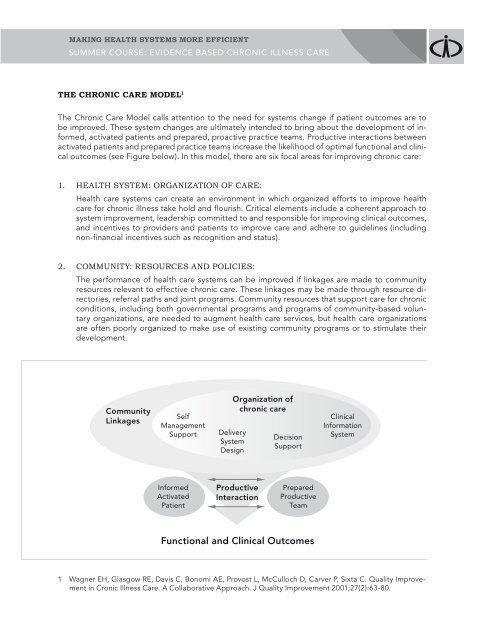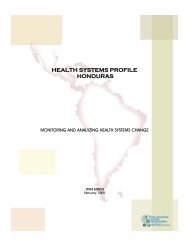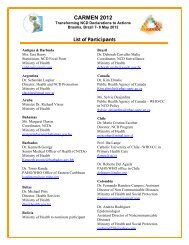EVIDENCE BASED CHRONIC ILLNESS CARE - PAHO/WHO
EVIDENCE BASED CHRONIC ILLNESS CARE - PAHO/WHO
EVIDENCE BASED CHRONIC ILLNESS CARE - PAHO/WHO
Create successful ePaper yourself
Turn your PDF publications into a flip-book with our unique Google optimized e-Paper software.
MAKING HEALTH SYSTEMS MORE EFFICIENT<br />
SUMMER COURSE: <strong>EVIDENCE</strong> <strong>BASED</strong> <strong>CHRONIC</strong> <strong>ILLNESS</strong> <strong>CARE</strong><br />
The Chronic Care Model 1<br />
The Chronic Care Model calls attention to the need for systems change if patient outcomes are to<br />
be improved. These system changes are ultimately intended to bring about the development of informed,<br />
activated patients and prepared, proactive practice teams. Productive interactions between<br />
activated patients and prepared practice teams increase the likelihood of optimal functional and clinical<br />
outcomes (see Figure below). In this model, there are six focal areas for improving chronic care:<br />
1. Health System: Organization of Care:<br />
Health care systems can create an environment in which organized efforts to improve health<br />
care for chronic illness take hold and flourish. Critical elements include a coherent approach to<br />
system improvement, leadership committed to and responsible for improving clinical outcomes,<br />
and incentives to providers and patients to improve care and adhere to guidelines (including<br />
non-financial incentives such as recognition and status).<br />
2. Community: Resources and Policies:<br />
The performance of health care systems can be improved if linkages are made to community<br />
resources relevant to effective chronic care. These linkages may be made through resource directories,<br />
referral paths and joint programs. Community resources that support care for chronic<br />
conditions, including both governmental programs and programs of community-based voluntary<br />
organizations, are needed to augment health care services, but health care organizations<br />
are often poorly organized to make use of existing community programs or to stimulate their<br />
development.<br />
Community<br />
Linkages<br />
Self<br />
Management<br />
Support<br />
Delivery<br />
System<br />
Design<br />
Organization of<br />
chronic care<br />
Decision<br />
Support<br />
Clinical<br />
Information<br />
System<br />
Informed<br />
Activated<br />
Patient<br />
Productive<br />
Interaction<br />
Prepared<br />
Productive<br />
Team<br />
Functional and Clinical Outcomes<br />
1 Wagner EH, Glasgow RE, Davis C, Bonomi AE, Provost L, McCulloch D, Carver P, Sixta C. Quality Improvement<br />
in Cronic Illness Care. A Collaborative Approach. J Quality Improvement 2001;27(2):63-80.
















